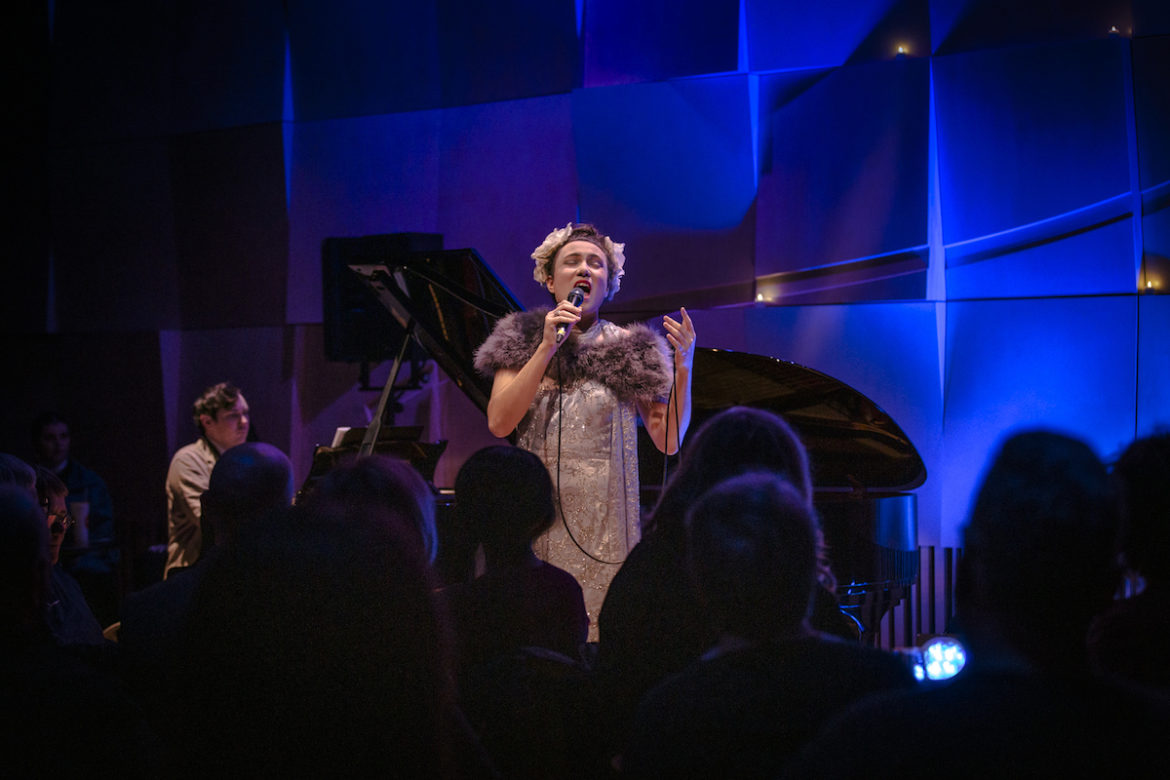Mama Alto’s Torch Songs at the Melbourne Recital Centre shows why she’s one of Australia’s most essential voices, says Ben Keene
Mama Alto is a unique performer who has accumulated a devoted audience for her heartfelt renditions of jazz classics. The appeal is obvious: her whole demeanour shouts an evocation of 1930s magic, combining the confidence, swagger and tenderness of the classic performers of that time.
Her vocal style is unique and powerful. She doesn’t just learn these songs: she studies them. Every vowel shape is deeply considered, and she often shifts key mid-phrase. But for all this complexity, she holds the core emotions of these songs close. At the heart of her practice is a sensibility attuned to the singers and writers of these works, the divas whom we remember for their incredible voices and striking beauty.
She explores the struggle of being a famous woman in those sexist times, how the parts of their lives that were deemed too complex or difficult were erased. This was echoed in official writing credits, which failed to record their contributions to the songs they often co-composed.
Torch Songs at the Melbourne Recital Centre was an opportunity to see her in her element. In the intimate surroundings of the Salon, we were seated at tables while Mama Alto, in perhaps the most glittery gown I’ve ever seen, sang seven ballads, ranging from Billy Holiday’s “Don’t Explain” to a compelling version of Stephen Sondheim’s “Send in the Clowns”. She was accompanied on a grand piano by William Elm, a skilled musician who matched Alto’s often off-the-cuff choices brilliantly.
Mama Alto is a political being. Her queerness is not the focus of her performance here but, as she puts it, “as long as I speak, I will be political”. This performance is no exception: between songs she tells tales of strength and reconciliation, of the struggle for recognition. As a transgender woman, she says, she can never truly be “invisible”. She recalls a conversation with an audience member who told her, with much delight, that if she hadn’t said she was trans, he would have assumed she was just “a really ugly, tall woman”. It’s quite a thing for her to say here on stage, looking the epitome of the diva.
I was seated across from an older woman who audibly scoffed when Mama Alto spoke about her queerness, or when she explored the wider cultural contexts that spawned these songs. This audience member had come for the voice, not for the person. This kind of ungenerous reaction claims that the singer is here to sing, not to tell her life story; but this is precisely the attitude that Alto strives against in this work. The singers she recalls were so often told just to perform and shut up. She draws out their histories, relating them to the contemporary struggles of the LGBTQI community, and allows us to hear the the full meanings of their songs.
There was only one issue that I found hard to get past, and that was the mixing of Mama Alto’s voice. As much as she is a singer, she is a performer of the microphone (much like Frank Sinatra claimed he was). She implements particular techniques to ensure her voice carries the right amplitude at the right moment, so an almost inaudible high note is able to carry through the whole room. The addition of massive reverb into this otherwise close and warm performance took away from the experience, rather than enhancing it. In the Salon’s intimate space I felt disconnected, trying to glean what I could through a cloud.
Mama Alto is becoming one of Australia’s most essential voices, not only for bringing a new vitality to these jazz standards, but as a leading icon of her community. I’m looking forward to seeing her again at the Melbourne Festival, when Gender Eurphoria, the show she co-created with Maude Davey, is returning to the stage. As far as I’m concerned, she’s unmissable.
Torch Songs, vocals Mama Alto, piano William Elm. Jazz in the Salon, Melbourne Recital Centre. July 19.

